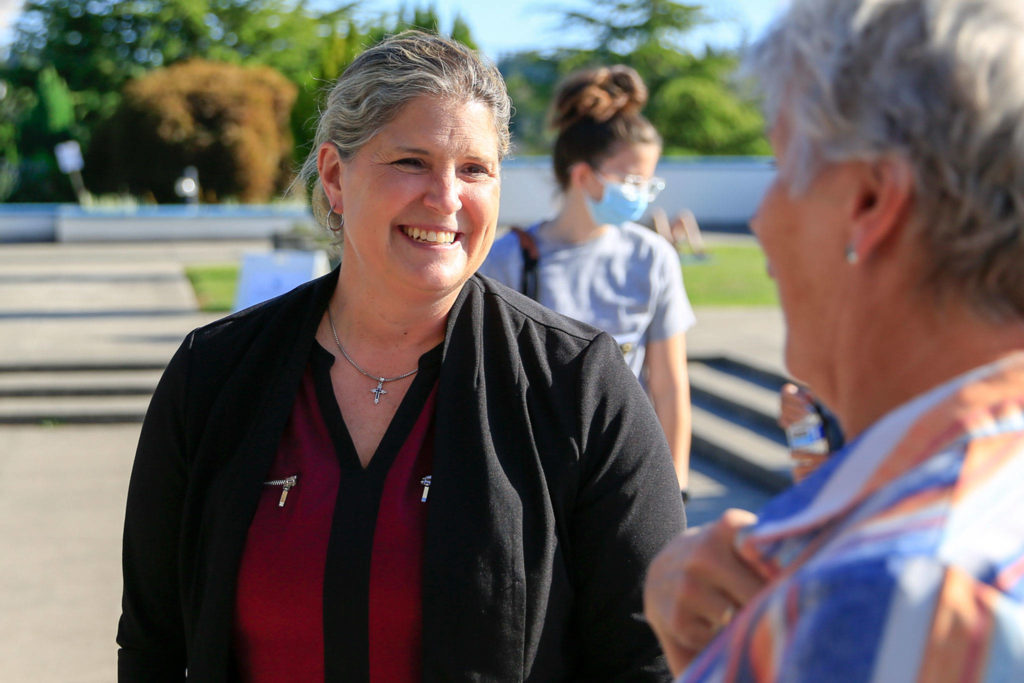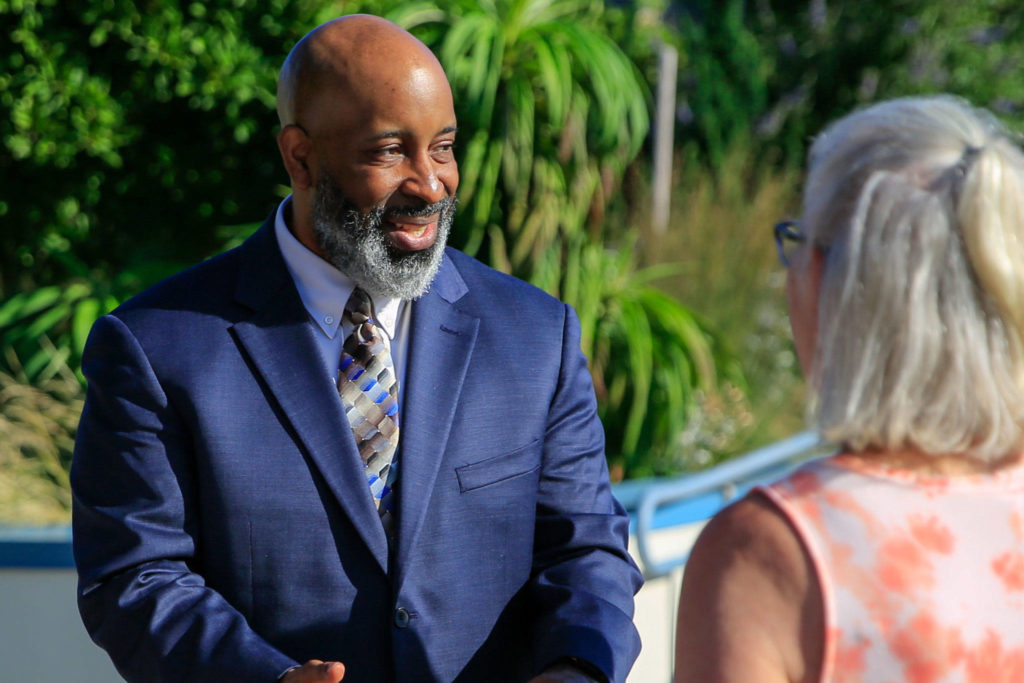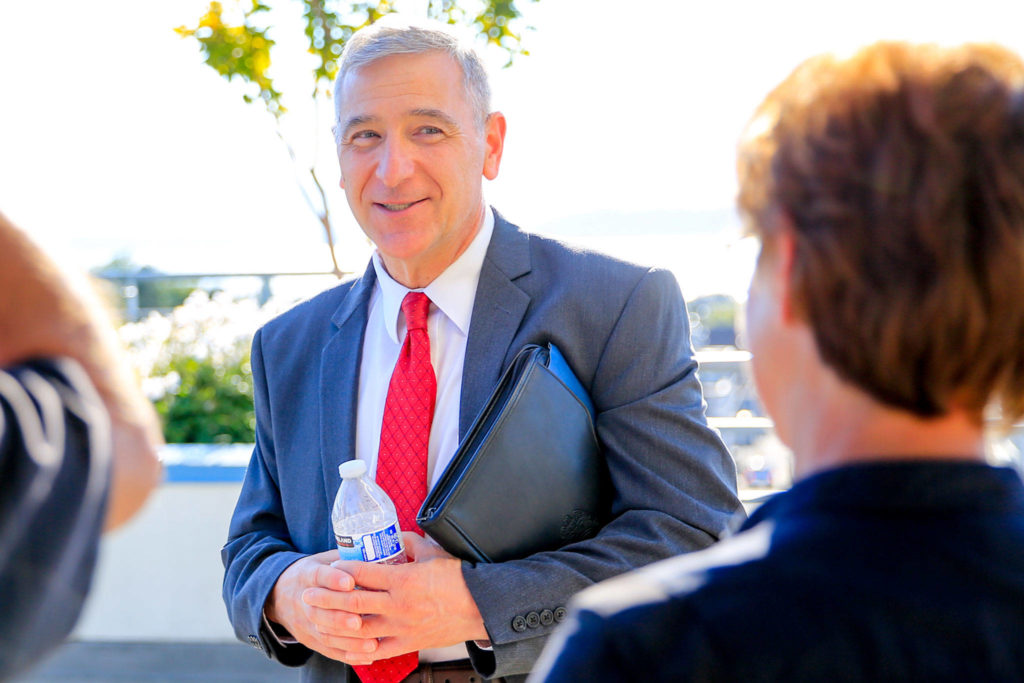EDMONDS — Following a failed national search for a new police chief, the public was invited to weigh in on the new round of finalists.
About two dozen locals attended a meet and greet with the three finalists in the Edmonds Library on Wednesday night, following public Zoom interviews conducted by city council.
The search, conducted by the International Association of Chiefs of Police, identified Acting Edmonds Police Chief Michelle Bennett, retired Waterbury, Connecticut Police Captain Lawrence Hunter and retired Pennsylvania State Police officer Dante Orlandi as finalists. Candidates were evaluated on their communication, interpersonal insight, problem solving, judgement, decisiveness, planning and delegation skills.
“Being here, I think, was the most effective way to get to know them better,” Edmonds resident Jeri Rask said, during the meet and greet. “They certainly are solid … and so it’s a difficult choice. Ultimately, it will be the mayor’s but I’m glad I have an opportunity to put a little feedback in the pool.”
Residents had the opportunity to provide feedback on the candidates via an online survey.
During the meet and greet, Edmonds locals asked candidates about their approaches to homelessness, their ability to build trust in the community and, for the two candidates from the East Coast, how they would adapt to West Coast life.
Hunter said he would have no problem connecting with locals and would work to foster better community relations by participating in events, staying active on social media and fostering a culture of transparency.
“So it’s going to take officers going to different functions … and not just in the keeping-the-peace capacity, but I mean being active participants,” Hunter said.
Hunter said he believes transparency is integral to policing. To him, that means releasing body cam footage within two days, holding press conferences and using Twitter to keep the public in the loop.
In contrast, Orlandi said not all information should be immediately made public.
“If there’s an officer-involved shooting, we’ll (share) that information, but out of respect for the officer, a lot of times we will not immediately release their name,” Orlandi said. He said officer-involved shootings are also traumatic for the officer.
However, in other instances, such as his officer driving under the influence in 2012, Orlandi said transparency is important.
“Having a trooper driving around intoxicated is not appropriate, and we’re going to do the right thing so that you continue to have trust in us,” he said. “It’s just second nature.”
Unlike Hunter and Orlandi, Bennett did not have to go too far from her post to attend Wednesday’s public meetings.
Bennett said stepping into her role in mid-March was challenging, but she’s helped the department regroup and refocus on their common goal: public safety.
“To me, the challenge is interesting,” Bennett said. “Because, you have all the right pieces — with these great people — and now structuring it in this new legislative world … that’s exciting to be able to do that from the ground up, to do it with the input from great people and, and to be innovative.”
She said she has been seeking advice from neighboring agencies as well as state officials about best practices as her department implements new policies related to House Bills 1310 and 1054, which establish new use-of-force standards and limit the use of vehicle pursuits and neck restraints.
Bennett stepped into the interim role after Acting Chief Jim Lawless left for a position in Marysville. Lawless was named a finalist in the city’s search to replace longtime Chief Al Compaan, but Mayor Mike Nelson instead appointed Sherman Pruitt, chief of police for the Sauk-Suiattle tribe near Darrington.
City Councilmembers Susan Paine, Laura Johnson and Luke Distelhorst all voted to speed up the confirmation process by a week and later, to confirm Pruitt. The decision was later reversed because Pruitt failed to disclose that he had applied for a position with the Lake Stevens Police Department and was rejected following a background check, according to a letter from the mayor retracting the offer.
During the Wednesday interviews, councilmembers asked the finalists about their ability to balance community policing and “law and order,” address mental health crises and improve the department’s current practices.
Bennett told councilmembers she feels uniquely equipped to tackle the expansion of community policing initiatives and amending the city’s complaint tracking system.
“Our goal isn’t to take them to jail,” Bennett said. “The goal is to solve your problem and to make you as healthy of a person as you can be. We’re here to assist.”
Bennett described her experiences partnering with local school districts and nonprofits to address opioid use in high schools, as well as the creation of wellness programs for officers to help prevent the harmful decisions that could be made by an officer experiencing burnout.
Bennett has had boots on the ground in the Puget Sound region for over three decades. She returned to Edmonds — where she got her start as a cadet — after serving in various leadership capacities at the King County Sheriff’s Office.
She has a bachelor’s degree in law and justice, a master’s of Science in psychology/organizational development and behavior, and a doctorate in education. She has taught courses in criminal justice at Shoreline Community College, Highline Community College, Northwest College in Kirkland and Central Washington University.
Bennett was a co-founder of M3 Leadership Solutions, a law enforcement consulting company for clients including the Washington Department of Fish and Wildlife, the Oregon Association of Chiefs of Police and the University of Washington Police, according to the website.
Hunter, host of “Captain Hunter’s Podcast,” served two decades with the Waterbury, Connecticut Police Department, with appointments in the crisis intervention team and professional standards divisions.
Like Bennett, Hunter operates a consulting business that offers courses for prospective and current law enforcement officials.
“Unfortunately, it can be a very conservative organization that believes … in the past about arresting their way out of different problems and circumstances, and that’s just not going to work going forward,” Hunter said.
In his retirement, he has used his podcast to amplify conversations about current events and fair policing, and authored “Police Reform: A Retired Police Captain’s Perspective on the Evolution of Law Enforcement in America & How to Improve the Criminal Justice System.”
“As far as the public conversation — I understand what it is,” Hunter said. “I was stopped by the police growing up a few times. I saw some interactions that I did not think that were very positive. And so it didn’t turn me off, but I decided to become part of the solution.”
In March 2020, Hunter testified in favor of Governor’s Bill 16, permitting regulated purchase and sale of marijuana in the state of Connecticut. In his testimony, he cited Gov. Jay Inslee’s statement about the success of regulated marijuana sales in Washington.
“This frees up significant law enforcement resources to protect our communities in other, more pressing ways,” Hunter quoted from Inslee.
In response to how he has and would tackle difficult decisions, Hunter said his decisions are always based on what’s best for the public.
“Case in point is implicit bias training — which I was an instructor of — a lot of officers didn’t understand why we had to teach implicit bias,” he said. “They will come to me and say ‘I’m not a racist.’ Well that’s great, I’m glad you’re not, but there’s still some items that we need to discuss and talk about.”
Hunter has a bachelor’s degree in Psychology from the University of Phoenix and a master’s degree in forensic psychology from Walden University. He is currently working toward his P.h.D from the University of the Cumberlands.
Orlandi is also a retired officer with decades of experience.
Orlandi was responsible in commanding units that were present at gas pipeline demonstrations, manhunts of “dangerous criminals” and “numerous racial tensions conflicts some of which made national news,” according to his candidate profile.
While serving as a commanding officer, Orlandi was named in a lawsuit for alleged negligence in the investigation of his officer who was accused of sexually assaulting a woman charged with harassing her ex-boyfriend.
That lawsuit was settled by the accused officer for $23,000.
Orlandi spent three decades as a Pennsylvania State Police Officer, working his way up to the captain position, and is a graduate of the FBI National Academy.
During interviews, he was careful in answering a question about what he would like to improve within the department. He said that at all police departments, training is important to prevent lawsuits.
Orlandi said part of what motivated his interest in a career in law enforcement was that he “wanted to win that war on drugs.”
“We utterly failed with drugs,” he said.
Like Bennett, he suggested partnerships between nonprofits and law enforcement can give those struggling with addiction a “fighting chance.”
Orlandi was recently considered for the public safety chief position in Longmont, Colorado.
In Pennsylvania, he said he was subject to mandatory retirement, but now he wants to get back into a leadership role.
“It just kills me not to be a part of something greater than myself,” Orlandi said. “It’s the reason why I came into law enforcement to begin with.”
In regard to police reform, Orlandi said it’s important to filter through the “silliness,” to listen and to be receptive to true community concerns.
Once the mayor reviews all of the input gathered from members of the community and city councilmembers, he will share his preference with the human resources director, who will conduct a background check, said Patrick Doherty, director of Economic Development and Community Services. The city council will then decide whether to confirm the candidate.
Isabella Breda: 425-339-3192; isabella.breda@heraldnet.com. Twitter: @BredaIsabella.
Talk to us
> Give us your news tips.
> Send us a letter to the editor.
> More Herald contact information.




























